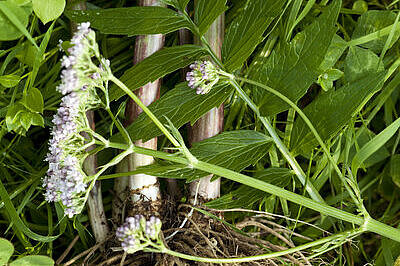Melissa root

Are you looking for a natural chew toy for your dog that is not only fun but also healthy? Then you should take a closer look at lemon balm root. In this article, you'll find out what lemon balm root is, what its advantages and disadvantages are and how you can offer it to your dog.
What is lemon balm root?
Lemon balm root is the root of the Mediterranean heather, also known as lemon balm. This plant belongs to the labiate family and has been used as a medicinal plant for centuries. The root has a pleasant lemon scent and flavor that attracts many dogs.
What are the benefits of lemon balm root for dogs?
Lemon balm root has many beneficial properties for dogs that can promote both physical and mental health. Here are some of them:
- Lemon balm root is a long-lasting chew. The root is very hard and resilient, so it doesn't wear down as quickly as other chews. This means that your dog will enjoy it for longer and you will save money.
- Lemon balm root is splinter-free. Unlike some bones or pieces of wood, which can splinter when chewed and injure your dog, lemon balm root remains intact. This reduces the risk of injury to your dog's mouth or digestive tract.
- Lemon balm root is rich in fiber. The root contains many indigestible fibers that can strengthen your dog's intestinal flora and promote digestion. This can be particularly helpful for dogs with sensitive stomachs or intestines.
- Lemon balm root is sugar-, gluten- and grain-free. The root is a purely natural product that contains no artificial additives or allergens. This makes it a good choice for dogs with food intolerances or allergies.
- Lemon balm root has a calming effect. The root has a high content of essential oils, which can have a relaxing effect on your dog's nervous system. This can be particularly helpful for nervous or anxious dogs that suffer from stress or overstimulation.
What are the disadvantages of lemon balm root for dogs?
While lemon balm root is a great chew toy for dogs, there are some disadvantages you should be aware of. Here are some of them:
- Lemon balm root can be too much of a good thing. If your dog chews or eats too much of the root, it can lead to diarrhea or vomiting. Therefore, you should always pay attention to how much of the root your dog consumes and offer him less if necessary.
- Lemon balm root can lead to tooth abrasion. The root is very hard and can lead to abrasion of the tooth surface if chewed frequently. This can lead to tooth sensitivity or inflammation of the gums. You should therefore always make sure that your dog's teeth are regularly cared for and offer him other chews if necessary.
- Lemon balm root can interact with medication. The root has a strong effect on your dog's nervous system and can therefore interact with some medications. This can lead to undesirable side effects. You should therefore always consult your vet before giving your dog lemon balm root if he is taking medication.
How do I give my dog lemon balm root?
If you want to offer your dog lemon balm root, there are a few things you should keep in mind to give him a safe and pleasant chewing experience. Here are some tips:
- Choose the right size. There are different sizes of lemon balm root that are suitable depending on your dog's weight and chewing strength. You should always choose a root that is larger than your dog's mouth so that he cannot swallow it.
- Supervise your dog when chewing. Even if the root doesn't splinter, you should always keep an eye on your dog when he's chewing it. This way you can make sure he doesn't hurt himself or eat too much of it.
- Clean the root regularly. The root can become dirty or attract bacteria over time. You should therefore rinse it regularly under running water and allow it to dry.
- Replace the root if it becomes too small. If the root becomes so small that your dog can put it in his mouth, you should dispose of it and offer him a new one. This way you avoid the risk of choking or suffocation.
Melissa root is a natural chew for dogs that has many benefits for the health and well-being of your four-legged friend. It is long-lasting, splinter-free, high in fiber, sugar-free and soothing. However, it also has some disadvantages, such as possible diarrhea, tooth abrasion or interactions with medication. Therefore, you should always pay attention to how much your dog chews or eats from the root, supervise it and regularly care for its teeth. You should also always choose the right size for your dog and replace the root if it becomes too small. If you follow these tips, you can offer your dog a great activity that is fun and good for him.
If you notice any signs of hypersensitivity or poisoning in your dog, you should see your vet immediately. We are not a substitute for a vet, but we try to be as accurate as possible. Every dog reacts differently and we recommend you get a second opinion or consult your vet if in doubt.
Stay healthy and take good care of your four-legged friend!😊
Similar to Melissa root
Valerian root is the root of the plant Valeriana officinalis, which is native to Europe and Asia. The root contains various ingredients that have an effect on the nervous system, such as valerenic...
Hop root is the underground part of the hop plant, which belongs to the hemp family. The root contains many valuable ingredients, such as bitter substances, flavonoids, tannins and essential oils....
St. John's wort root is the root of the St. John's wort plant (Hypericum perforatum), which is mainly found in Europe and Asia. The plant has yellow flowers that bloom in summer and exude a pleasant...
Chamomile root is the dried root of chamomile (Matricaria chamomilla), a plant from the Asteraceae family. Chamomile is best known for its flowers, which can be used to make a tasty and healing tea....



